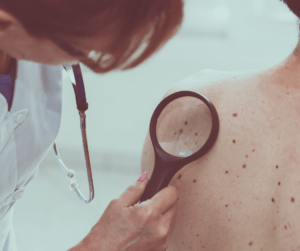With one in five Americans developing skin cancer by the age of 70, skin cancer has become the most common cancer in the United States. Many types of skin cancer are caused by exposure to ultraviolet (UV) light from UV rays from sunlight or tanning beds.
During the month of May, Skin Cancer Detection and Prevention Month, health organizations and doctors spread awareness about the potential risks of skin cancer and educate people on how to limit exposure.
What is skin cancer?
 Skin cancer is the abnormal growth of skin cells and is most often found on skin exposed to the sun. Certain types of skin cancer can also occur on areas of your skin not ordinarily exposed to sunlight. There are three major types of skin cancer — basal cell carcinoma, squamous cell carcinoma and melanoma.
Skin cancer is the abnormal growth of skin cells and is most often found on skin exposed to the sun. Certain types of skin cancer can also occur on areas of your skin not ordinarily exposed to sunlight. There are three major types of skin cancer — basal cell carcinoma, squamous cell carcinoma and melanoma.
What are the signs of skin cancer?
Skin cancer develops primarily on areas of sun-exposed skin, including the scalp, face, lips, ears, neck, chest, arms and hands, and on the legs in women. Skin cancer may initially appear as a nodule, rash or irregular patch on the surface of the skin. These spots may be raised and may ooze or bleed easily. It’s important to keep an eye on any unusual skin markings because as the cancer grows, the size or shape of the visible skin mass may change and the cancer may grow into deeper layers of the skin.
Be wary and see a doctor if any sudden spots are shaped irregularly, uneven in color, larger than the size of a pea and have grown over the past few weeks.
Can I prevent skin cancer?
The best way to reduce your risk of skin cancer is to protect yourself from harmful UV radiation. That means wearing sunscreen (even if the sun is not visible), protecting your eyes with sunglasses, wearing a hat if exposed to direct sunlight and seeking shade or staying indoors if the UV index is too high. It is also advised to avoid indoor tanning beds. The hours from 9 a.m. until 3 p.m. are the most hazardous for UV exposure outdoors, so if possible stay out of direct sunlight during these hours.
When should I see a doctor?
You should seek medical attention if you notice any changes to your skin that worry you or have watched a new marking change over recent weeks.
If you are concerned about a specific spot, please reach out to St. George Medical Clinic to schedule an appointment. One of our health providers will investigate the suspicious spot to determine the cause. Call 304-478-3339 today.
With temperatures becoming warmer and nice days up ahead, be sure to protect yourself and your skin. You should enjoy the summer weather, but enjoy the sun safely to reduce your chance of skin cancer in the future.